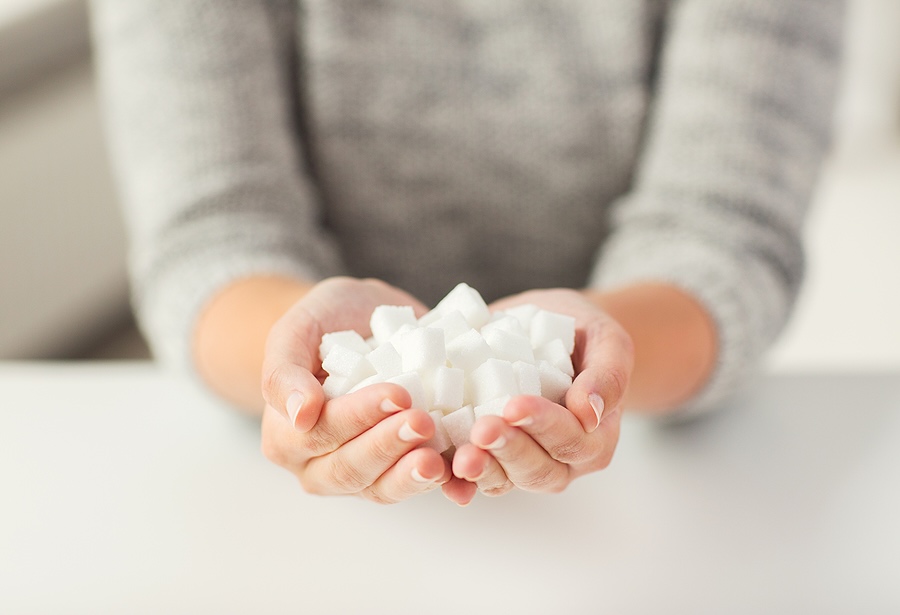Updated: October 19th, 2025
- Sugar consumption may be impacting your hormonal balance.
- Medications simply mask symptoms; they don’t find the root cause of the problem.
- Overconsumption of sugar is hard to avoid, since sugar is hidden in so many foods.
- Sugar impacts the entire endocrine system.
- My simple tips can help you kick the sugar habit and keep hormone levels balanced.
I’d heard Kelly’s story before. In fact, I’d lived it.
The first time I saw Kelly, she told me that her PMS symptoms were out of control, disrupting her life so much that she could barely function for several days each month. I knew that feeling well; those same symptoms nearly ruined a long-anticipated trip to Europe when I was 20 years old. I was so overwhelmed that I was unable to muster any enthusiasm for the necessary preparations for what should have felt like an exciting adventure.
I lived with these feelings for far too long, all throughout my twenties. Month after month, I felt like I was on a roller coaster ride that all too often hit the lows instead of the highs. I was bloated, nauseated, had excruciating cramps, low energy and an out of control appetite – especially for sweets.
I shared all this with Kelly to give her some hope that help was available. After my own experience, I have made it my personal mission to share what I wish I had known all those years ago far and wide so other women don’t have to suffer like I did.
All too often, problems stemming from hormonal imbalance (during PMS, perimenopause or menopause) are seen as things women can’t control. Even with all the information that has been discovered about the factors that cause hormones to go haywire, conventional medicine often fails to take these issues seriously. In fact, women are often told flat out that they either need to get used to it or take prescription medications to cope with these symptoms.
Here’s the problem with that approach: medication does nothing to correct the actual problem! Bloating, weight gain, cramping, mood changes, hot flashes, and so many other symptoms commonly associated with PMS and/or menopause are your body’s cry for help. And without fixing the actual root cause of these symptoms, you may experience them at any time, not just during your menstrual cycle. That’s because the real issue is that your hormones are out of balance – and the longer they stay that way, the worse the symptoms become.
There are myriad reasons your hormones don’t remain perfectly balanced, and the natural highs and lows of sex hormones throughout the menstrual cycle and as we age is certainly one. But there’s another factor that should be high on your radar when dealing with uncomfortable symptoms: the overconsumption of sugar. And since PMS often comes with intense cravings for sugar and simple carbs, it’s critical to understand how sugar and hormonal balance are connected.
Let’s take a look at the connection between sugar and hormones. Then, I’ll give you some tips to help you kick the sugar habit and reset your hormones to a healthy balanced state.
How Does Sugar Contribute to Hormonal Imbalances?
Sugar is everywhere – not just in desserts! Food manufacturers sneak sugar into everything, and it adds up to a huge impact on your body! That’s why I read labels thoroughly and stick to whole foods as often as I can. Labels can be misleading – you have to read the ingredients list to get the real story. A good rule of thumb, though, is that if food has been processed, the nutritional value has been seriously depleted.
Meals or snacks high in sugar can create blood spikes in insulin which has an impact on a protein known as sex hormone binding globulin (SHBG). Insulin spikes cause SHBG levels to dip. That’s important because SHBG helps to control the amount of sex hormones available to the body When there’s not enough SHBG, levels of these other hormones rise, but they are bound in the tissue rather than being bioavailable.
To make matters worse, insulin also boosts testosterone production, and excess testosterone is converted into estrogen by the fat tissue in the abdominal region. The ratio of estrogen to progesterone becomes skewed – and you end up with uncomfortable symptoms.
Refined sugar also has an impact on both the adrenal glands and the thyroid, both of which are responsible for the production of hormones essential to healthy body functioning.
The adrenals regulate cortisol (a major hormone that helps your body cope with stress), aldosterone, (which controls blood pressure), and other hormones. Your body interprets blood sugar spikes as stress, causing cortisol levels to increase, which can ultimately lead to difficulty processing stress. Consistently high levels of cortisol can lead to adrenal fatigue, which can leave you feeling anxious and both jittery and completely drained.
The thyroid secretes hormones that regulate metabolism, cognitive function and body temperature. Thyroid dysfunction and metabolic syndrome go hand in hand. Chronic high blood sugar from eating too many carbohydrates is the root cause of metabolic syndrome. Eating too many carbs (which convert quickly to sugar), as we saw earlier, causes problems with insulin levels. If insulin levels are too high for too long, the body stops responding to it properly. This causes more insulin production, which can lead to insulin resistance. And insulin resistance damages the thyroid gland, which then can’t produce the necessary hormones to maintain good health.
Hormones are an intricate communication system in your body, and they are all interconnected. When levels of one hormone are off, other hormones are influenced as well. So even if sugar consumption doesn’t directly affect a specific hormone, the odds are that a diet high in sugar will eventually lead to imbalances throughout the endocrine system.
Tips to reverse the impact of sugar on your hormones
Cutting carbohydrates altogether is not the answer to avoiding sugar-related hormonal imbalances. Your body needs carbohydrates, just like it needs protein and healthy fats. Avoiding all forms of sugar would mean giving up fruit, vegetables and legumes – and that’s certainly not what I’m suggesting! But you can do plenty to both lower your intake of refined sugar, reduce cravings, and support hormonal balance. Here are my top suggestions:
Pay attention to your glycemic load
The glycemic load refers to the impact that the carbs you eat will have on blood sugar. It’s best to increase blood sugar and insulin gradually, avoiding dramatic peaks and dips. Simple sugars, like those found in processed foods, cause quick increases. Complex carbohydrates consumed with fiber, protein and healthy fats allow for slower rise and fall in blood sugar and insulin levels. What can you do to lower the glycemic load? Avoiding “white foods” like rice, potatoes, and foods made from white flour or sugar can help. Brown rice and sweet potatoes are great substitutions. Skipping carb-heavy sides in favor of extra vegetables is another thing you can try..
Hydrate with water, not sugar laden drinks
It always surprises me when women who are careful about the foods they eat are addicted to soda, coffee loaded with cream and sugary syrups, or even fruit juice in large quantities. One soda has more sugar than the daily recommendation for women! Hydration is essential for a healthy body, and filtered water is the best option. If drinking water holds little appeal, try infusing it with fruit or adding just a touch of real fruit juice. Naturally flavored sparkling water is another good option.
Rethink what’s for breakfast
American breakfasts are carb central! Pancakes, cereal, French toast, muffins, bagels, and pastries – so many of the foods we consider “breakfast” foods are loaded with carbohydrates and sugar. Even eggs, an otherwise good choice, are often served as a sandwich. One of the easiest ways to reduce consumption of simple carbs is to overhaul your breakfast menu. Try eggs scrambled with meat and vegetables, a protein shake, or even leftovers from dinner instead!
Challenge your cravings
It’s true that cravings are often a call for nutrients your body needs. But when the urge to eat something sweet strikes, I can safely say your body isn’t calling for a candy bar. Cravings can be powerful, but you still have control. Pause for a few minutes before reaching for the doughnut you think you want. Take a drink of water. Eat a piece of fruit instead. The natural sugar and fiber will most likely fill your body’s needs and your craving for junk food will fade.
Include protein, fiber and healthy fats in each meal or snack.
When you eat a sweet treat by itself, your blood sugar levels will rise quickly – and crash just as quickly. I’m not saying you should never eat sweets. Just make sure it’s a treat, not a habit, and eat it with your meal or snack. A small dish of ice cream after a balanced dinner is much easier on your body than a cookie (or several) between meals.
Support your body naturally
Hormones under assault need some gentle support. Nutritional supplements and/or herbal solutions can help reset and maintain hormonal balance as you make the necessary diet and lifestyle adjustments. A high-quality multivitamin that includes zinc, vitamin C and B-vitamins can help curb sugar cravings. An Omega-3 supplement also reduces cravings and inflammation and improves insulin sensitivity. I have a range of pharmaceutical grade supplements designed to support overall health as well as specific hormonal problems in my online store.
Learn to manage stress effectively
Stress is as hard on your body as sugar. If both are in play at the same time, balance will be exceedingly difficult to maintain. Cortisol impacts blood sugar, cravings, and the balance between estrogen and progesterone. Managing stress is a lifelong learning process, but the more techniques you have in your tool belt, the easier you’ll be able to stop stress before it takes over. Deep breathing is one of the most effective stress busters – and you can do it anywhere! Even if it’s the only thing you do to decrease stress, make a habit of taking deep, cleansing breaths several times each day. I start and end my day with deep breathing. I also practice while on hold, standing in line, and any other time I have a few moments of waiting to fill.
Don’t skimp on exercise and sleep
Both exercise and quality sleep impact your hormones, including insulin. “Burst” training can be highly effective and doesn’t take a lot of time. Be careful, though. If hormones are imbalanced, exercise that is too vigorous can create more problems. If you haven’t been active at all, it’s best to start with walking or gentle exercise.
Give your body the sleep it needs
Setting up routines for good sleep hygiene can help you get the sleep your body needs and keep hormones balanced. Set a regular time for both going to bed and waking up in the morning. Ensure that your environment is cool and relaxing. Keep electronics out of the bedroom! If you use a computer, tablet, phone or watch television in the evening, wear special glasses that block the blue light, which can disrupt circadian rhythms and make sleep difficult.
Kick the sugar habit and feel great again!
No matter how difficult it seems, it IS possible to reduce sugar intake and balance your hormones to lose weight and feel great. I gave up sugar decades ago, and I have rarely looked back! When I do indulge, even a little, the negative impact on my body is so obvious that I immediately realize it’s not worth it. So although getting started can be tough, I am confident that how you feel if you reduce or eliminate sugar consumption will convince you too!
Kelly listened to my story, and decided to give it a shot. After a month of cutting out all added sugars and trying some of my other recommendations, including some gentle supplemental support, she couldn’t believe how she felt. At her first follow up appointment, she celebrated the fact that she’d just had her period, and for the first time in years she, not her PMS symptoms, was in control. That could be you!









